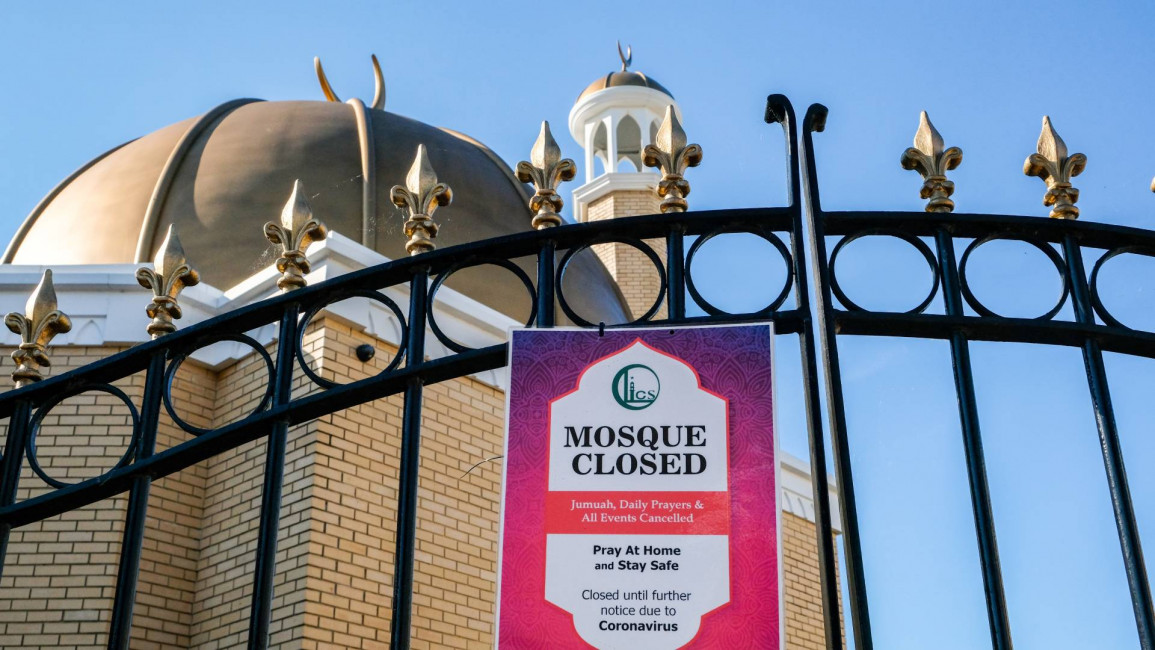Can we pray in congregation? UK Muslims calls for clarity as mosques set to reopen
Can we pray in congregation? UK Muslims calls for clarity as mosques set to reopen
Mosques in England are urging the government to give clearer guidance on group worship .
2 min read
Mosques in England have been closed [Matthew Chattle/Barcroft Media/Getty]
Mosques in England are calling for clearer guidance as to how and when they can re-open amid the coronavirus pandemic.
The Coordination Committee for Mosques and Islamic Centres in London released a statement on Wednesday urging the UK government to give guidance "on the timing and conditions for the reopening of mosques for collective worship".
The Coordination Committee for Mosques and Islamic Centres in London released a statement on Wednesday urging the UK government to give guidance "on the timing and conditions for the reopening of mosques for collective worship".
Mosques and other religious sites in England were given the go-ahead last week to open for private worship on June 15. Social distancing measures must be followed and worship groups and weddings will not be permitted, PA reported.
But this group of mosques has said that while "that may be appropriate for some faiths, it does not take into account that congregational prayers are the main act of worship within a Mosque".
The committee also noted that Black, Asian and minority ethnic (BAME) people are disproportionately affected by coronavirus.
"Therefore, we consider the safety and well-being of our congregations as a paramount concern," it said.
Community organisations in the UK which contributed to a government report into the disparities in the effects of Covid-19 epidemic last week condemned the removal of a section which discussed the reasons behind why BAME people are at higher risk.
One of these groups, the Muslim Council of Britain (MCB), released a statement saying it was "extremely concerning" that the report did not discuss the role of structural racism in the disproportionate number of BAME deaths from the virus.
Following the publication of the review last week, reports surfaced that an entire section had been removed from the final version.
In this section, over 1,000 organisations and individuals had given evidence, much of which highlighted how discrimination and poorer life chances heightened the risk of coronavirus for those from BAME backgrounds.
The UK Minister for Equalities said last week Wednesday that the report was unable to make recommendations on addressing the disparities in Covid-19 outcomes for BAME people because there was not enough data available.
Read more: Covid-19 lays bare Britain's entrenched racial inequalities
Findings showed that more than a third of seriously ill coronavirus patients were from BAME communities, who represent just 13 per cent of the UK population.
The UK is one of the worst-hit countries by the pandemic, with more than 41,000 deaths attributed to Covid-19 by June 12, according to the Department of Health and Social Care.
Agencies contributed to this report.
Follow us on Facebook, Twitter and Instagram to stay connected


![Lebanese protesters take part in a demonstration in support of Palestinians on 18 May 2021 in Beirut, Lebanon. [Getty]](/sites/default/files/styles/image_212x120/public/2021-06/GettyImages-1232967618.jpg?h=58c8a5e7&itok=VxDT8yaL)
